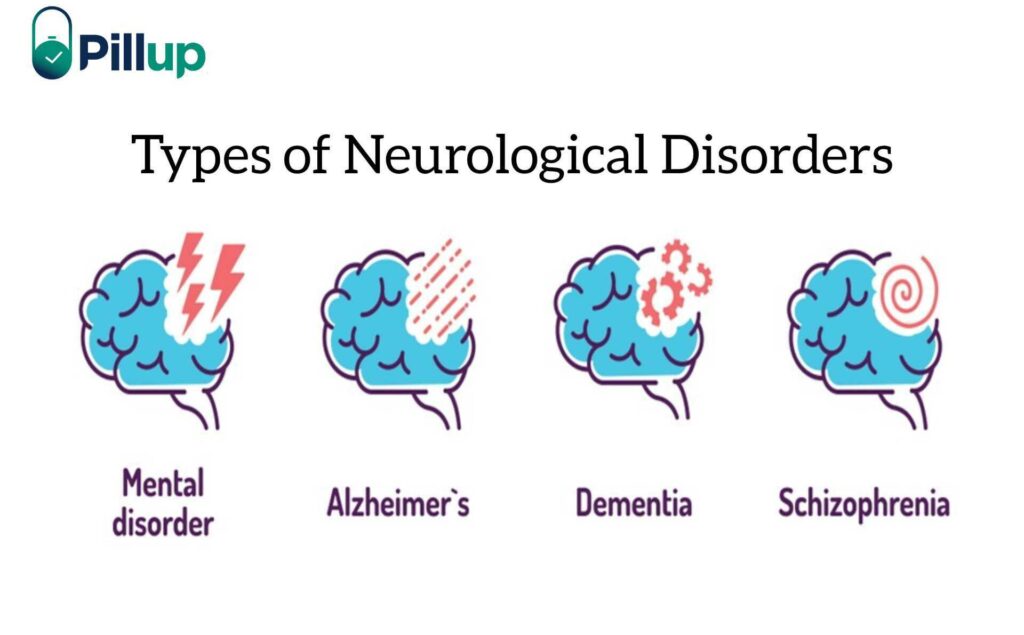Did you know that over 1 billion people worldwide suffer from some neurological disorder? That’s a staggering number, highlighting the importance of understanding the different types of neurological diseases and their symptoms. Whether you or someone you know is affected by a neurological disorder, having a basic understanding of the different types can help you make informed decisions about your health.
Neurological disorders can affect the brain, spinal cord, and nerves throughout the body. They can cause many symptoms, from muscle weakness and tremors to memory loss and mood changes. But with so many different types of neurological disorders, it can be overwhelming to know where to start.
In this blog post, we’ll explore the main types of neurological disorders and their symptoms, so you can better understand these conditions and their impact on your health. We’ll also discuss some common treatments and management strategies for these conditions, giving you the tools you need to take control of your health.
What are some common types of Neurological Disorders?
A. Degenerative disorders
Degenerative disorders are a group of neurological diseases that occur due to the progressive decline of nerve cells in the brain or spinal cord. These disorders often develop slowly and worsen over time. Here are the three main types of degenerative disorders:
- Alzheimer’s disease – It is the most common cause of dementia, affecting memory, thinking, and behavior. The accumulation of abnormal protein clumps in the brain characterizes it.
- Parkinson’s disease – Parkinson’s disease is a disorder that affects the nervous system, causing tremors, stiffness, and difficulty with coordination and balance. The loss of dopamine-producing neurons in the brain causes it.
- Huntington’s disease – Huntington’s disease is a rare genetic disorder that causes the breakdown of nerve cells in the brain. Symptoms include involuntary movements, cognitive impairment, and emotional disturbances.
While degenerative disorders are not yet curable, there are treatments available that can help manage symptoms and improve quality of life. Early diagnosis and treatment can also help slow the progression of these disorders.
B. Vascular disorders
Vascular disorders are caused by the impairment of blood flow to the brain. They are often due to blockages, bleeding, or ruptures in the blood vessels that supply the brain. Here are some of the most common vascular disorders:
- Stroke: A stroke occurs when blood flow to the brain is interrupted due to a blocked or burst blood vessel. This can cause brain damage or even death.
- Transient Ischemic Attack (TIA): Also known as a mini-stroke, TIA is caused by a temporary blockage in a blood vessel. While the symptoms resemble a stroke, they usually last only a few minutes and don’t cause permanent damage.
- Aneurysms: An aneurysm is a bulge in a blood vessel caused by a weakened wall. If an aneurysm ruptures, it can lead to a stroke or even death.
Managing vascular disorders involves identifying and treating the underlying cause of the disorder. In some cases, surgery may be necessary to repair the blood vessels. Medications can also be used to manage symptoms and prevent further damage.
C. Trauma-related disorders
Trauma-related disorders are neurological conditions that occur due to physical injury or trauma to the brain or spinal cord. Here are two examples of such disorders:
1. Concussion:
- A traumatic brain injury is caused by a blow to the head or a violent shaking of the head and upper body.
- Symptoms can include headaches, dizziness, confusion, and memory loss.
- In most cases, the symptoms of a concussion will improve within a few weeks, but in some cases, they can last for months or even years.
2. Spinal cord injury:
- Damage to the spinal cord is often caused by a traumatic blow or accident.
- Symptoms can include paralysis, loss of sensation, and loss of reflex function below the level of injury.
- The effects of spinal cord injury can be devastating and long-lasting and affect a person’s ability to work, socialize, and carry out daily activities.
If you have experienced a traumatic injury, it is important to seek medical attention immediately. Early treatment and rehabilitation can help reduce the long-term effects of trauma-related disorders.
D. Epilepsy and Seizure Disorders
Epilepsy and seizure disorders can significantly impact a person’s quality of life. The following are some common types of epilepsy and seizure disorders:
- Generalized epilepsy: In this type of epilepsy, seizures simultaneously affect both sides of the brain. Tonic-clonic, absence, and myoclonic seizures are some examples of generalized epilepsy.
- Focal epilepsy: Seizures in this type of epilepsy start in one specific brain area. These seizures can cause both motor and non-motor symptoms.
- Reflex epilepsy: This type of epilepsy is triggered by specific stimuli, such as flashing lights or loud noises.
- Status epilepticus: This is a medical emergency where a seizure lasts longer than five minutes or two or more seizures occur back-to-back without a recovery period in between.
Proper diagnosis and treatment are essential to manage epilepsy and seizure disorders. If you or someone you know is experiencing seizures, it’s crucial to seek medical attention promptly.
E. Infections
Infections are another category of neurological disorders that can affect people of all ages. Bacterial or viral infections can cause these disorders and can result in severe brain damage. Here are two common infections that fall under this category:
- Meningitis is an inflammation of the meninges, the protective membranes surrounding the brain and spinal cord. A bacterial or viral infection causes meningitis, and the symptoms include fever, headache, and a stiff neck. Meningitis can lead to seizures, brain damage, and even death if left untreated.
- Encephalitis is an inflammation of the brain that a viral infection can cause. Encephalitis can result in various symptoms, including fever, headache, confusion, and seizures. It can lead to permanent brain damage or even death in severe cases.
It is essential to seek medical attention if you suspect you have any of these infections to prevent the risk of severe complications.
F. Tumors
Tumors affecting the nervous system can lead to various neurological disorders, and their severity can vary significantly.
Here are some of the common types of tumors that affect the nervous system:
- Brain tumors are the most common type of tumors affecting the nervous system. Brain tumors are classified as either primary or secondary and can be benign or malignant. Symptoms of brain tumors include headaches, seizures, nausea, vomiting, and difficulty with speech or vision.
- Spinal cord tumors: These tumors grow within or near the spinal cord and can cause a range of symptoms, including back pain, numbness or weakness in the limbs, difficulty walking, and loss of bowel or bladder control. Treatment options for spinal cord tumors include surgery, radiation therapy, and chemotherapy.
If you suspect you may be suffering from a neurological disorder, seeking medical attention as soon as possible is essential. Early diagnosis and treatment can help to manage symptoms and prevent further damage to the nervous system.
G. Autoimmune Disorders
Autoimmune disorders occur when the body’s immune system attacks healthy cells by mistake. Multiple Sclerosis and Myasthenia Gravis are the most common autoimmune disorders that can affect the nervous system. Here’s a brief overview of each:
- Multiple Sclerosis: A chronic disease of the central nervous system that affects the communication between the brain and the rest of the body. The immune system attacks and damages the myelin sheath that covers nerve fibers, resulting in symptoms like fatigue, muscle weakness, and vision problems.
- Myasthenia Gravis is an autoimmune disorder affecting the muscles and nerves, leading to weakness and rapid fatigue. It occurs when the immune system mistakenly attacks the receptors responsible for muscle contraction, resulting in muscle weakness, drooping eyelids, and difficulty swallowing.
Autoimmune disorders can be complex and challenging to diagnose. However, early diagnosis and treatment can help manage symptoms and slow disease progression. If you suspect you may have an autoimmune disorder, it’s important to speak with a healthcare provider to receive an accurate diagnosis and start appropriate treatment.
Prevention and Management Strategies for Neurological Disorders?
Preventing and managing neurological disorders is critical to improving the quality of life for those affected. Here are some strategies that can help:
A. Lifestyle Changes to Prevent Neurological Disorders
- Eating a healthy diet that is rich in fruits, vegetables, and whole grains
- Staying physically active and exercising regularly
- Avoiding smoking and excessive alcohol consumption
- Getting enough sleep and managing stress levels
- Protecting yourself from head injuries
B. Management Strategies for People Living with Neurological Disorders
- Taking prescribed medications as directed by your doctor
- Engaging in physical therapy or rehabilitation programs to improve motor skills and overall function
- Using assistive devices such as canes or walkers to enhance mobility and independence
- Seeking support from mental health professionals to manage depression and anxiety
- Participating in support groups or other social activities to reduce feelings of isolation
C. Support for Family and Caregivers
- Providing emotional support and encouragement to their loved one
- Helping with daily activities and tasks, such as grocery shopping or transportation
- Seeking respite care or other support services to alleviate caregiver burnout
- Educating themselves about the disorder and available resources
Remember, preventing and managing neurological disorders requires a comprehensive approach involving the person with the disorder, their family, and healthcare professionals.
Conclusion
Neurological disorders can affect anyone regardless of age, gender, or background. It is important to recognize the symptoms associated with these disorders and seek professional help for proper diagnosis and treatment. Some disorders can be managed effectively with medication and lifestyle changes, while others may require more advanced treatments.
In addition, innovative companies like PillUp can also help those with neurological disorders manage their medications and stay on track with their treatment plans. With PillUp’s pre-sorted medicines, individuals can be more independent and punctual in their medication regimen, leading to better overall health outcomes.



